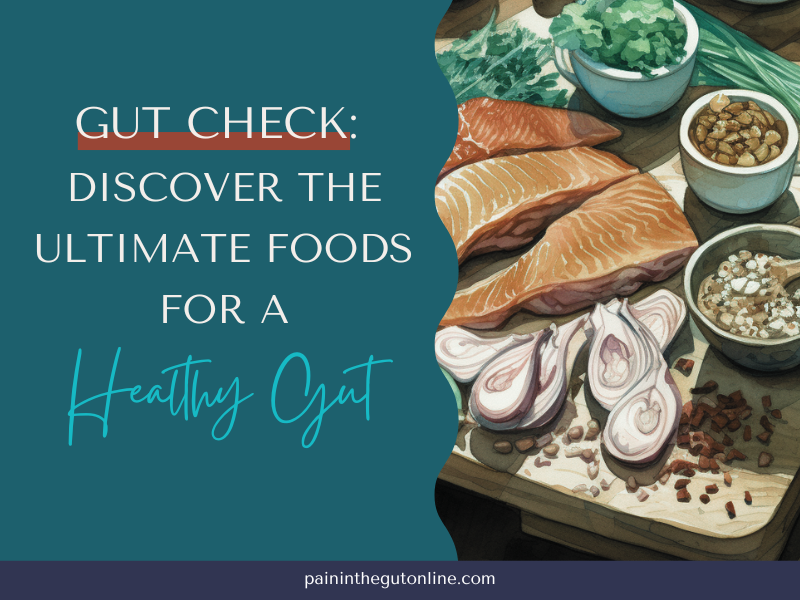FOODS FOR A HEALTHY GUT
7 min read/1,625 words
Discover foods for a healthy gut and tips to boost your digestive health in your fab 40s and beyond!

Table of Contents
Why is Gut Health Important?
Your gut isn’t just responsible for digestion; it plays a significant role in your overall health. A healthy gut contributes to a strong immune system, heart health, brain health, improved mood, effective digestion, and even healthy sleep.
One of the most crucial roles your gut plays is in your immune system. A large portion of your immune cells resides in your gut, making gut health vital in fighting off infections and diseases.
A healthy gut can also impact your mental health.
Have you ever heard of the term “gut feeling”? There’s more truth to it than you might think. Your gut and brain are connected through a network called the gut-brain axis, and your gut’s health can directly impact your mental well-being.
Maintaining a healthy gut isn’t just about eating the right foods or taking gut health supplements.
It’s about nurturing the complex ecosystem within your gut.
It’s about ensuring that beneficial bacteria thrive and harmful bacteria are kept in check.
And it’s about providing these beneficial bacteria with the nutrients they need to function optimally, which brings us back to the importance of ‘foods for a healthy gut.’
Stay tuned as we explore the best foods for a healthy gut and how to incorporate them into your diet.
Foods for a Healthy Gut
The foods you eat play a pivotal role in nurturing a healthy gut. Let’s discover the top categories of foods that can help.
Probiotics: Your Gut’s Best Friend
Probiotics, often called “good” bacteria, are vital for maintaining an equilibrium in your gut microbiome. They aid in digestion and nutrient absorption and support your immune system.
Probiotic-rich foods include yogurt, kefir, sauerkraut, miso, and other fermented foods. Regularly including these foods in your diet encourages a healthy community of gut bacteria.
Remember, always choose unsweetened versions of these foods. Sugars can feed the “bad” bacteria and disrupt the balance in your gut.
Fiber-Rich Foods: The Gut Cleanser
Fiber acts like a broom, sweeping through your digestive tract and taking waste and toxins with it.
Whole grains, legumes, fruits, and vegetables are high in dietary fiber. Regular consumption of these foods can promote regular bowel movements, prevent constipation, and reduce the risk of gut diseases.
Antioxidant Foods: Gut’s Shield Against Damage
Antioxidants protect your gut from damage by neutralizing harmful free radicals.
Berries, nuts, dark chocolate, and green tea are among foods high in antioxidants. These foods not only protect your gut but also contribute to overall health and wellness.
Incorporating probiotics, fiber, and antioxidants into your daily meals gives your gut the best chance for optimal health. For more information on how to improve your gut health or if you’re interested in gut health supplements, feel free to explore our other articles.
Remember, taking care of your gut is taking care of your overall health.
How to Incorporate Gut-Healthy Foods into Your Diet
Eating foods for a healthy gut doesn’t mean you have to compromise on taste. With a little creativity, you can incorporate gut-friendly ingredients into every meal.
Here are some foods for a healthy gut to help you get started.
Breakfast Ideas
Breakfast is the perfect time to kick-start your day with some gut-nourishing foods.
Try a bowl of oatmeal topped with fresh berries and a dollop of Greek yogurt. The oatmeal provides a good source of fiber to help clean your gut, while the berries offer antioxidants. The yogurt provides probiotics.
Another idea is a smoothie made with spinach, banana, chia seeds, and almond milk. Spinach is packed with fiber and antioxidants, banana offers prebiotics (food for your probiotics), chia seeds are a great source of fiber, and almond milk is a lighter, non-dairy option that’s easier on your gut.
Lunch and Dinner Ideas
For lunch and dinner, aim for a balance of lean proteins, whole grains, and a variety of vegetables.
A quinoa salad with grilled chicken, spinach, bell peppers, and a drizzle of olive oil is a gut-healthy choice. Quinoa and chicken offer protein, spinach, and bell peppers deliver antioxidants, and olive oil provides healthy fats.
Another great option is a bowl of lentil soup served with a side of sautéed greens. Lentils and greens are rich in fiber, and cooking them well ensures they’re easy to digest.
Snacks and Desserts
Snacking doesn’t have to be a gut health downfall.
Swap out chips for crunchy raw vegetables paired with hummus. Vegetables are high in fiber, and hummus offers both protein and fiber.
For dessert, have a bowl of mixed berries topped with a sprinkle of dark chocolate shavings. Berries bring in antioxidants and fiber, while dark chocolate (in moderation!) contains antioxidants and can be a prebiotic.
Remember, everyone’s gut is unique, so what works for one person may not work for another. Listen to your body and adjust your diet accordingly.
For more information about gut health and how to optimize it, check out our articles on gut health and the gut microbiome. If you’re considering adding supplements to your diet, read our guide on gut health supplements before making any decisions. Happy eating!
Things to Limit or Avoid for a Healthy Gut
While focusing on including the right foods for a healthy gut, knowing what can potentially harm your gut health is equally important.
These include certain foods and habits that can disrupt your gut balance.
Foods that Harm Gut Health
While they might taste great, some foods can wreak havoc on your gut health.
These include:
- Highly Processed Foods: Often high in unhealthy fats, sugars, and artificial additives that can disrupt your gut microbiome. They also lack the fiber and nutrients your gut needs to function optimally.
- Sugary Drinks and Snacks: Excessive sugar is harmful to your gut bacteria. It can lead to an imbalance in your gut microbiome and contribute to several health issues.
- Alcohol: While moderate alcohol consumption might not harm your gut health, excessive drinking can. It can damage your gut lining and lead to a leaky gut.
- Gluten: For some people, gluten can cause inflammation in the gut, leading to uncomfortable symptoms. If you’re sensitive to gluten, it’s best to avoid it for optimal gut health.
Habits that Affect Gut Health
Your lifestyle habits can significantly impact your gut health.
Some habits to watch out for include:
- Poor Sleep Habits: Lack of sleep or irregular sleep patterns can disrupt your gut microbiome. Ensure you get a good night’s sleep for a healthy gut.
- Stress: Chronic stress can negatively affect gut health. It is important to find healthy ways to manage stress, such as yoga, meditation, or other relaxing activities.
- Lack of Exercise: Regular physical activity can help promote a healthy gut by encouraging the growth of beneficial gut bacteria. Try to include some form of exercise in your daily routine.
- Overuse of Antibiotics: While antibiotics are sometimes necessary, they can also harm your gut health by killing off both good and bad bacteria. If possible, limit your antibiotic use and consider taking gut health supplements to help replenish your good gut bacteria.
By being mindful of these foods and habits, you can make better choices that support your gut health.
Remember, a healthy gut is fundamental for your overall well-being. For more information on how to maintain a healthy gut, check out our other articles on gut health and the gut microbiome.
FAQs About Gut Health
When it comes to maintaining a healthy gut, you may have a few questions.
Can Certain Foods Improve Digestion?
Absolutely! Certain foods can indeed help improve digestion.
Incorporating a variety of fiber-rich foods into your diet, like fruits, vegetables, whole grains, and legumes, can help keep your digestive system running smoothly. These foods add bulk to your stool, making it easier to pass and thus preventing constipation.
Probiotic-rich foods like yogurt, sauerkraut, and kimchi are also great for your gut. They contain beneficial bacteria that can help balance your gut microbiome, supporting healthy digestion. For more information, check out our detailed article on foods for a healthy gut.
What is the Role of Gut Bacteria in Overall Health?
Gut bacteria, often referred to as gut flora or the gut microbiome, play a crucial role in your overall health.
They assist in breaking down food, absorbing nutrients, and even play a role in immune function. A healthy balance of gut bacteria can help prevent digestive issues like irritable bowel syndrome (IBS) and inflammatory bowel disease (IBD).
Research has linked a healthy gut microbiome to several other aspects of health, including weight management, mental health, and heart health. For more on this, take a look at our in-depth coverage of the gut microbiome.
How Long Does it Take to Improve Gut Health Through Diet?
Improving gut health through diet isn’t an overnight process – it requires time and consistency.
Generally, you might start to see improvements in your gut health within a few weeks of making dietary changes. However, it could take several months of consistently consuming gut-healthy foods for more long-term changes in your gut microbiome.
Remember, everyone’s body is different, so the time it takes to see improvements can vary from person to person. It’s always a good idea to consult with a healthcare professional before significantly changing your diet.
If you’re interested in supplements to support gut health, you might find our guide to gut health supplements useful.
To learn even more about gut health, grab our FREE Beginner’s Guide to Gut Health, where you’ll learn about the five focus areas for a healthy gut, and you’ll get a list of 60 gut-friendly foods you can easily incorporate into your meal plans for a gut-healthy boost.







